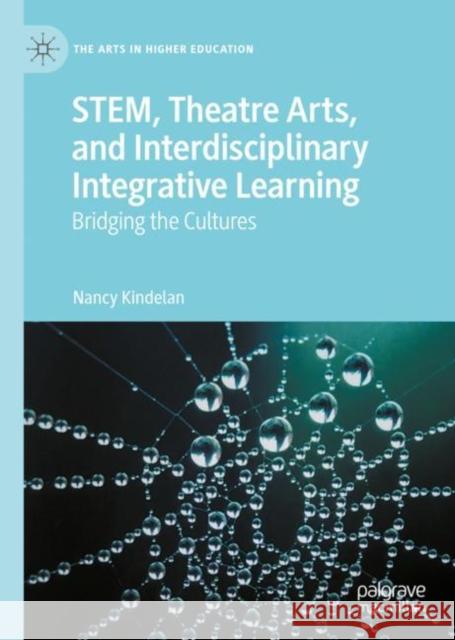Stem, Theatre Arts, and Interdisciplinary Integrative Learning: Bridging the Cultures » książka



Stem, Theatre Arts, and Interdisciplinary Integrative Learning: Bridging the Cultures
ISBN-13: 9783031089060 / Angielski / Twarda / 2022 / 313 str.
Stem, Theatre Arts, and Interdisciplinary Integrative Learning: Bridging the Cultures
ISBN-13: 9783031089060 / Angielski / Twarda / 2022 / 313 str.
(netto: 420,71 VAT: 5%)
Najniższa cena z 30 dni: 385,52
ok. 22 dni roboczych.
Darmowa dostawa!
1 Introduction: Why Include Theatre Arts in New Modes of Undergraduate Education?.
References and Suggestions for Further Reading.
2 Meeting the Challenges of Shifting Education Paradigms.
Introduction.
Greater Expectations, AAC&U’s Essential Learning Outcomes, and Principles of Excellence.
Educational Practices.Integrating STEM with the Humanities and Arts.
Conclusions.
References and Suggestions for Further Reading.
3 Let’s Get Started.
Introduction.Liberal Arts, Liberal Education, and General Education.
Why Integration and What Is It?.
STEM, STEAM, and SHTEAM.
Other Examples of Integration (STS, STIRS, and STEMM).
Modes of Learning: Multidisciplinary, Interdisciplinary, Transdisciplinary, Integrative, and Applied.Transformative Learning.
Factoring in Implementation.
Conclusions.
References and Suggestions for Further Reading.
4 Enhancing Learning Through Integrative Education: On the Road.Introduction.
Learning in the Digital Age.
Integrative Learning: Signature Work and Capstones.
The Whole Is Greater than the Sum of Its Parts.
Disciplinary Knowledge Versus Interdisciplinary Connections.Additional Roadblocks.
The Road Ahead.
From the Inside Looking Out.
A Call to Action.
Conclusions.References and Suggestions for Further Reading.
5 Bridging the Gap Between STEM and Theatre Arts.
Introduction.
Theatre Arts Programs and the Theatre Practitioner.
Signature Pedagogies.The Theatre Practitioner.
The Scientist.
The Mathematician.
The Engineer.
The Scientist, the Mathematician, the Engineer, and the Theatre Artist.
Liminal Spaces.
The Artistic Paradox: Humanism Versus Practicality.
Conclusions.References and Suggestions for Further Reading.
6 The Marriage of Disparate Disciplines.
Introduction.
Bridging the Gap Between Theatre and STEM.
The Artist as Scientist and the Scientist as Artist.Leonardo da Vinci and Johann Wolfgang von Goethe.
Collaborative Partnerships.
Conclusions.
References and Suggestions for Further Reading.
7 The Creative Spirit.Introduction.
What Is Creativity?.
Where Is Creativity?.
Can Creativity Be Taught?.
Crossing Boundaries: Myths, Misconceptions, and Labels.
The New Frontier: “ArtScience” Collaborations.
Creative Pathways.
The Practice of Making.
Design Thinking and Systems Thinking.Conclusions.
References and Suggestions for Further Reading.
8 Facing the Creative Imperative.
Introduction.
Decoding the Disciplines.
More About Decoding.
Unpacking the Language, Strategies, and Creative Process in Theatre Arts.
No Muses on Stage Please.
Beyond “Soft Skills”.Toward Effective Storytelling.
What Is an Imagistic Analysis?.
Practicing the Art of Creativity in Theatre.
Teasing Out Similarities.
Divergent and Convergent Thinking.
Various Positions on the Scientific Method.
Sharing Creative Practices: Engineering and Theatre.
Social and Professional Skills.
Walking the Walk.Sitting at the Table of Curriculum Reform.
Conclusions.
References and Suggestions for Further Reading.
9 Answered and Unanswered Questions.
Introduction.
Making the Case.
Looking Forward.
The Players and the Process.
Questions, Concerns, and Suggestions for Further Research.References and Suggestions for Further Reading.
Appendix V1: Good Questions: Drawing on Theater to Educate Reflective Engineers as Civic Participants, by Alison Wood.
Appendix V2: Constructing and Performing the Self: An Interdisciplinary Course That Transforms Scholars and Selves, by Jonathan M. Adler.
Appendix V3: Contemplating Science: A New Educational Paradigm for Interdisciplinary and Integrative Learning in Engineering, by Yevgeniya V. Zastavker and Madhvi J. Venkatesh.
Appendix V4: Theater Brings Community Voice to Bear on Wicked Problems, by Sarah A. Brownell.
Appendix V5: The Three-Year Theatre Engineering Capstone Experience: Scaffolding the Integration of Theory and Practice, by Rich Dionne.
Appendix V6: Portfolios That Build Community, by Leigh Witek.
Appendix V7: Going Beneath, by Lance Gharavi.
Appendix V8: Transdisciplinary and Multimodal Live Performance Research and Integration into the Curriculum, by Daniel Fine.
Appendix V9: Data Theatre, by Rahul Bhargava.
Appendix V10: Mechanics Meets Metaphor: An Interdisciplinary Web, by Liam Hofmeister.
Appendix V11: A Heart–Brain Connection: What Giraffes Taught Me About Science and the Arts, by Virginia Anderson.
Appendix V12: Reflections, by Shane L. Collins.
Appendix V13: Catalyst Collaborative@MIT: Pictures of Practice, by Debra Wise.
Biographies.
Index.
“This wide-ranging and masterful book…is necessary and urgent reading not only for those people in theatre arts and STEM fields in a liberal arts context, but indeed for everyone with an interest and an investment in the future of STEM, Arts, and Humanities tertiary education worldwide.”
—Joshua Abrams, Deputy Director, The Hong Kong Academy for Performing Arts and Past President, Association for Theatre in Higher Education
“Kindelan offers a call to action and practical roadmap for educators interested in forging connections between STEM and theater arts fields. The book’s compelling firsthand narratives are icing on the cake, offering implementation examples and testaments to the many ways that disciplinary boundary crossing inspires and empowers both students and teachers.”
—Robert Martello, Professor, Olin College of Engineering, USA
“Integrative interdisciplinary learning has been a goal of higher education but is complex to understand and challenging to implement. Kindelan offers a comprehensive and highly readable overview that will guide educators as they reflect on these issues and plan and assess reform efforts taking place on individual campuses.”
—Nancy Budwig, Professor, Clark University, USA
This book responds to challenging questions about holistic curricular realignment, especially how a more porous approach to higher education reduces the impact of a “siloed” curriculum, lessens the tendency toward the fragmentation of knowledge, allows for the development of cross-disciplinary explorations, and promotes new approaches to knowledge and creativity through interdisciplinary integrative learning. In doing so, Kindelan advances discussions about integrative interdisciplinary education between STEM and the fields of performance and performance technologies that have been either overlooked or underdeveloped.
Nancy Kindelan is Professor Emerita of Theatre at Northeastern University, Boston, USA, where she directed plays and taught numerous interdisciplinary courses, honors courses, script analysis and performance classes. She is the founding editor of the Palgrave Macmillan book series The Arts in Higher Education.
1997-2026 DolnySlask.com Agencja Internetowa
KrainaKsiazek.PL - Księgarnia Internetowa









